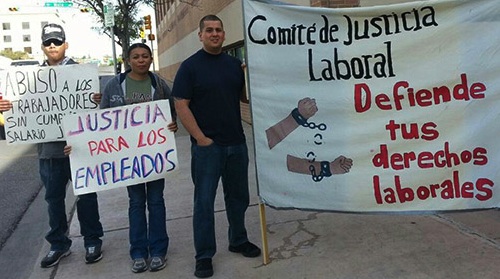Above: Members of the workers’ rights group, Comité de Justicia Laboral (Labor Justice Committee) protest wage theft during an Oct. 7 action in El Paso, Texas. Photo by Alberto Aguirre.
When construction worker Jose Rivera opened his pay envelope, it was bad news. His employer had paid him only $100 for a 40-hour workweek.
When he complained, the employer, a subcontractor, told him the contract for the job paid less, so workers had to accept less. Some of Rivera’s younger co-workers were so demoralized they cried.
Not Rivera.
“I felt anger,” he said, speaking through an interpreter on Oct. 10 in El Paso. “We didn’t have food to take home.”
Wage theft — when an employer fails to pay a worker the mandated minimum wage, overtime pay or pays nothing at all — costs American workers an estimated $50 billion a year, according to a report by the Economic Policy Institute.
Low-wage workers are the hardest hit by wage theft. A landmark 2008 survey of 4,387 workers in low-wage industries in Chicago, Los Angeles and New York City found 26 percent of the workers were paid less than the minimum wage in the week prior to the survey, and 76 percent of those who worked more than 40 hours were not paid the legally required overtime rate.
Federal law requires every worker, regardless of immigration status, to be paid. Around the nation, cities and states have passed laws to prevent wage theft and provide legal recourse for workers. But for the estimated 6.5 million undocumented workers in the U.S., the prospect of fighting for what they’ve earned is especially fraught.
“There’s intense competition [for jobs], and they can easily be replaced,” said Eric Murillo, an organizer with Comité de Justicia Laboral (Labor Justice Committee), a grassroots group in El Paso.
Workers also fear retaliation: “They’re afraid they’re going to get reported [to Immigration and Customs Enforcement],” said Murillo.
Undocumented workers are nonetheless the impetus behind a campaign to get the city of El Paso to adopt a wage theft ordinance. On “Moral Tuesdays,” members of Comité de Justicia Laboral demonstrate outside El Paso City Hall, urging city leaders to consider such an ordinance. On Monday, the City Council agreed to consider an ordinance.
“The majority of our workers [in Comité de Justicia Laboral] are undocumented workers,” Murillo said. “They participate in public protests and they’re out there at City Council, so they’re really brave.”
The idea for a wage theft ordinance in El Paso is modeled on one passed by the Houston City Council in 2013. Houston’s law established a process that allows employees to bring wage claims against companies.
Those companies with a documented record of wage theft — either through court or criminal conviction — are ineligible for city contracts. Any company with a criminal conviction is also ineligible for city licenses and permits.
Such municipal ordinances are necessary, advocates for workers say, because Texas’ enforcement of federal and state worker protection laws is lax. Of the workers in Texas paid by the hour, 6.4 percent earned at or below the minimum wage in 2013, compared with 4.3 percent nationwide, according to the Bureau of Labor Statistics.
The Texas Workforce Commission (TWC) investigates wage claims under the Texas Payday Law (TPL), but advocates for workers say TWC doesn’t have enough investigators to do the job, and the statute of limitations on filing a complaint is too short.
A worker has six months after the date of nonpayment to file a TPL complaint, not enough time for “workers who likely do not know that the Commission exists,” according to a report by labor and civil rights groups.
The TWC has 23 Labor Law investigators and six staff members that provide administrative support and intake on wage claims. “TWC’s Labor Law Department will investigate all complaints,” the agency said in a statement.
“If a determination is made in favor of the former employee, the agency can file administrative liens on the employer when appropriate. TWC will investigate and take every possible action on behalf of workers in order to recover unpaid wages.”
In 2012, TWC helped workers collect more than $6.29 million in unpaid wages, according to the agency.
For workers, Paso del Norte Civil Rights Project and Border Network for Human Rights, Comité de Justicia Laboral hands out bilingual flyers informing them of their wage rights and encouraging them to advocate for themselves. Murillo said workers join Comité de Justicia Laboral with the understanding that “you’re going to help other workers after your fight.”
The first step is mediation. Workers and their advocates call a company and then follow up with a site visit where they present the employer with a demand letter.
If that fails, workers and advocates may launch a public pressure campaign, such as the recent picket of a downtown El Paso restaurant in support of a worker who said she was paid less than minimum wage, with no overtime, for three years.
Picketers succeeded in getting the restaurant to close early.
“We were definitely able to impact their business,” Murillo said. The case is now in small claims court, but Murillo said pressure tactics aren’t always successful: “In some cases, it works, and in some cases, the restaurants don’t care.”
Encouraged by the successful passage of living wage ordinances around the country, a coalition of labor and immigration groups plans to push for a “living wage” ordinance for city employees and businesses contracting with the municipality. The coalition proposes starting with a minimum wage of $10 an hour and eventually reaching, in phases, $15 an hour, Murillo said.
In 2008, the Austin City Council enacted an $11-per-hour living wage minimum for city employees, making it among 125 municipalities across the country with living wage laws, according to the National Employment Law Project.
Although the impact of the Austin ordinance is limited to city government employees and city contractors — Texas law bars cities from regulating the wages paid by private businesses — Murillo sees securing a living wage for EL Paso city employees as a step toward raising the wage floor for all workers in the state.
“We need a state-level law [for a living wage] … if we can get some major cities to push this, I think we have a really good chance,” he said.
As for Jose Rivera, who is a legal resident, he brought 12 of his co-workers to Comité de Justicia Laboral. They took their employer to small claims court, and El Paso County put a lien on the construction company’s property. Rivera finally received the money he had earned in 2012.
“It took a year and a half, but we won,” he said.
The Fuerza del Valle Workers Center of Texas has links to information, both in English and Spanish, to help workers: Know Your Rights to Fair Pay, Farmworkers Know Your Rights (English and Spanish), Legal Issues Affecting Domestic Workers in Texas, Employment Protections for Domestic Workers









